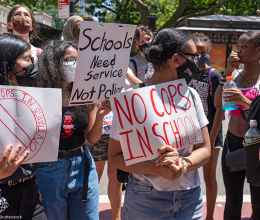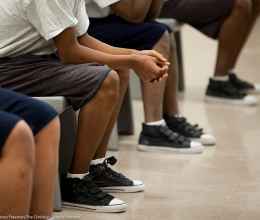
Youth with disabilities, including intellectual and developmental disabilities, are more likely to be subjected to exclusionary disciplinary practices and to be arrested.
From the Department of Education’s Civil Rights Data for Florida, we know that, compared to youth without learning disabilities, as evidenced by individualized learning plans, our youth with such disabilities are:
- 2.7 times as likely to be suspended,
- 17.4 times as likely to be expelled,
- 3.25 times as likely to be referred to law enforcement, and
- 7.8 times as likely to be arrested at school.
Other studies show that 65 to 70 percent of youth involved in the justice system have a disability.
Furthermore, studies have found that at least 75 percent of youth in the juvenile justice system have experienced traumatic victimization, leaving them at risk for mental health disorders, including post-traumatic stress syndrome. Left unaddressed, these traumas can lead to mental health and substance use disorders, school failure, increased risk taking, and, ultimately, delinquency. Youth removed from their home by Florida’s Department of Children and Families are nearly three times as likely to be arrested.
Youth struggling with disabilities and trauma are particularly vulnerable to the negative effects of the current school discipline and juvenile justice practices.
Contributing Factors
- Unmet Needs. Youth with disabilities often have needs that their environment is not meeting. Many youth swept up by the juvenile justice system come from families that lack the resources to navigate the education system to ensure their needs are met in the classroom. Often disabilities have not been recognized or diagnosed. Even when a disability is recognized, supports to accommodate the disability are difficult to acquire for the most engaged family.
Youth with intellectual and developmental disabilities may be more impulsive, more susceptible to peer influence, be more easily frustrated and have difficulty unlearning inappropriate behaviors. Youth suffering with trauma can be hyper-vigilant and have problems with aggression, isolation, impulsivity and self-injuring. When in a high-stress situation, like a school conflict, these students’ reactions tend to be even more extreme, as they are in a fight-or-flight mental state. By pushing these kids out of the classroom, schools sacrifice their education in the name of preserving the broader learning environment. But exclusionary discipline and arrests do not make it more likely these kids’ needs will be met. Furthermore, environments supportive of developing the executive functioning of our most vulnerable youth would also support the development of all youth.
- Victimization. Students with disabilities are bullied more often than those without. These students are also more likely to respond to bullying with aggression.
Recommendations
Ending the School to Prison Pipeline through refocusing school discipline on developing executive functioning skills in youth, rather than punishment or exclusion, will help all youth. Encouraging schools to refocus school resource officers on safety, not discipline, is vital, as is encouraging the adoption of programs rooted in restorative justice and pre-arrest diversion. To specifically combat the unfair treatment of youth with disabilities, you can also:
- Encourage schools to use Functional Behavior Assessments and Behavior Intervention Plans when a student’s behavior is a recurring issue. This assessment identifies the reason behind the behavior to inform appropriate interventions for the plan.
- Advocate for school policies on crisis plans that focus on de-escalation and support. Similarly, advocate for policies that give youth access to a safe space where they can calm down safely.
- Advocate for school policies that ensure mental health evaluations are considered in any exclusionary discipline action.
- Advocate for school policies requiring mental health professionals and parents be present for questioning by administration and/or law enforcement.
- Advocate for training for teachers, school personnel and law enforcement officers on de-escalation techniques and the effects of trauma on youth, and appropriate responses to minimize youth’s posttraumatic stress reactions.
- Encourage collaboration between the child welfare, education and juvenile justice (when involved) systems to meet the needs of youth struggling with disabilities and trauma.
Resources:
Department of Education, Civil Rights Data Collection - Investigate school discipline rates in relation to disability (IDEA) status, can compare state, district and school level data.
National Disability Rights Network
National Center for Mental Health and Juvenile Justice
Greene, Esq., J. D., & Allen, O. W. (2017). Disrupting School-Justice Pathways for Youth with Behavioral Health Needs, National Council of Juvenile and Family Court Judges.





